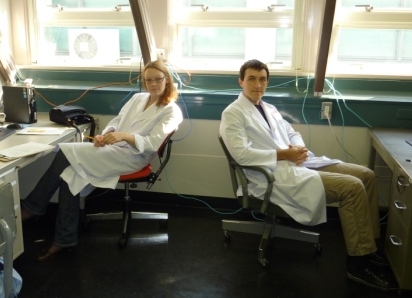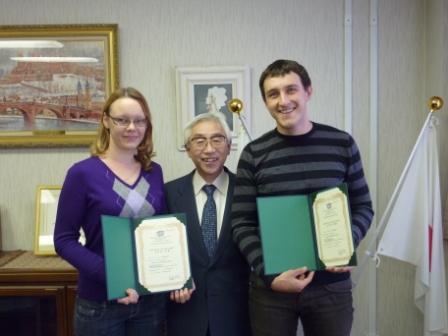Over the Years
Home > Over the Years > > Two Researchers from Russia and Latvia Invited for Training
Two Researchers from Russia and Latvia Invited for Training
From Russia and Latvia HICARE invited two young researchers engaged in research to support those who were exposed to radiation in the Chernobyl nuclear accident, for two-month's training on the treatment of radiation disorders.
Names and Titles of Trainees:
Oleg Kovalev
Federal Institutions Medical Radiological Research Center of
Russian Academy of Medical Science
Russia
Liga Larmane, Researcher
Laboratory of Biochemistry, Riga Stradins University
Latvia
Period of Training:
Training Organizations (in order of visits):
Radiation Effects Research Foundation
Kurakake Nozomi-en (A-bomb survivors nursing home)
Hiroshima Atomic Bomb Casualty Council
Facilities related to Nagasaki Association for Hibakushas' Medical Care (NASHIM)
Hiroshima Peace Memorial Museum etc.
Training Course:
Assessment of the biological effects of radiation

Ms. Liga Larmane(left) and Mr. Oleg Kovalev(right) at the Radiation Effects Research Foundation

The Training Completion Ceremony with President of HICARE Hiroo Dohy (center) at Hiroshima Red Cross Hospital & Atomic-bomb Survivors Hospital
Feedback:
[Mr. Oleg Kovalev]
The HICARE training provides medical professionals in my country with an unparalleled opportunity to visit medical practice facilities using the cutting-edge knowledge in radiobiology. In this training we can extend our knowledge through study tours to see actual research conducted systematically.
The stay in Japan, a richly exotic country with unique culture and nature, will be an unforgettable memory for participants. They can also widen their view of the world through the experience. All these benefits were brought about by the professional work of HICARE's staff members to make our stay in Japan comfortable. I would like to express my sincere appreciation to HICARE.
[Ms. Liga Larmane]
The HICARE training is an exceptional chance for scientists outside Japan to learn abundant new information and accumulate knowledge and experience. In the training, I was able to acquire practical skills by participating in research using new methods to study radiation effects. The training also changed my perspectives on science and general qualitative research activities. I had the opportunity to meet many experienced scientists and establish a valuable relationship with them. They gave me answers to many questions that I had long been seeking. Now I know to whom I should write to ask help when I face a question in my research in Latvia and I'm sure that I can obtain an answer.
I thank HICARE for inviting me for this training in Hiroshima. I unconditionally recommend other young researchers to participate in this training supported by HICARE.




